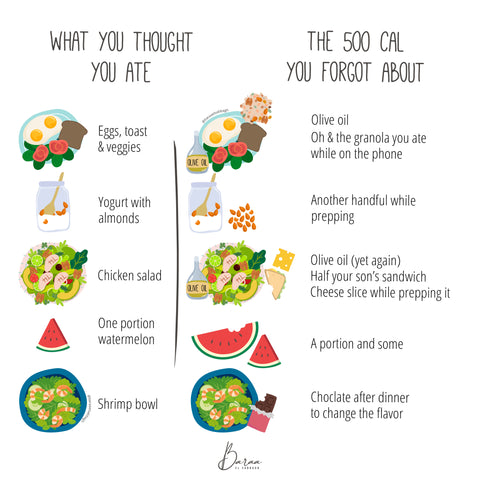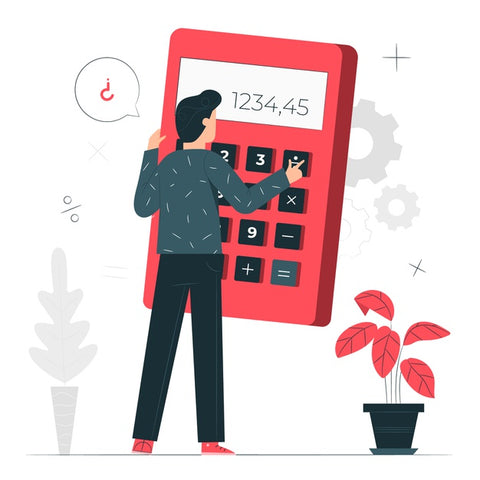How to calculate your calories? By Baraa El Sabbagh, Personal Trainer, Registered Dietician, and Sports Nutritionist In Dubai
Aug 17, 2021
Calculating Calories: Back To Basics
Welcome back to another exciting blog post. I say exciting because we are talking about everyone’s favorite topic: calories. I have received so many questions about this that I had to address it, because I want this to be a continuously educational platform about the subjects YOU’RE interested in. Whether you live in Dubai, the states, or Australia, I want to help you understand those fickle calories once and for all! If you'd rather hear this episode on B for Better Health, head over here.
Online Workouts On Instagram With A Personal Trainer

If you were part of my program B’s Stronger Summer Workouts, you would have received an email all about calories and how to accurately count and calculate them into your day. If you weren’t on that program, no worries I got your back right here. Also, if you were part of that program and you want more workouts or you felt some FOMO that you missed the last one, I’ve got good news for you: My Fit & Fab July Workouts will be even more fun and energetic! Check out the details here, it’s basically an awesome online workout program filled with 4 LIVE sessions a week with me on Instagram.
Now, let’s get back to calories!
Why Should We Count Calories?
Calories play a huge role in our fitness journey. If you’ve been working yourself to the bone trying to get results but haven’t been losing or gaining weight or if you’ve plateaued for the past couple of months, calories could be the culprit.
Fitness and nutrition are BFF’s. Consider them inseparable. One without the other leads to you reaching part of your goals and not all of them. When you workout regularly and pay attention to the food you’re eating, nothing can stop you! So ask yourself: are you putting the right effort into your nutrition like you are with your exercise and vice versa? If there is a part of you that thinks you can do better with your food, let me help you get there!
Story Time About Calories
I have a friend, Layal, who thought she was eating 1,600 calories a day, and wasn’t missing a single workout - but she still hadn’t reached her goal weight or seen any progress. I asked her to write down everything she ate that day and guess what? She was eating an extra 500 calories without realizing it! When we snack here and there, add an extra spoonful of rice, accept that second glass of wine, or reach into the nuts bag 6 to 12 times at a gathering, we forget to take all those extra calories into account! It’s fine to do all the above things by the way, I’m all for more nuts, but those need to be accounted for.
So this is WHY we need to count calories: because the number can get away from us and we’re left confused as to why our bodies aren’t changing.

How To Calculate Calories
There’s a calculator online that’s great at telling you what your daily needs are, it’s called TDEE. All you need to do is add your weight, height, and age. Then the part that asks how active you are, assess your routine. Are you working out 4 to 5 times a week with active rest days? That would be considered moderate exercise. If you’re working out less than that but still pretty active, go for light exercise. And lastly, if you’re not working out right now, go for the sedentary option.
Calculate Calories To Reach Your Goals
Great! Now you have the number of calories that your body burns daily. Next comes the part where you define your goals. Are you looking to lose or gain weight? Because there are different numbers for those! If you want to lose weight, subtract 20% of your total daily calories. If you want to gain muscle, add 5% to your calorie intake. And when you just want to maintain your weight, stick to the number the website gave you.
Calorie Calculators & Their Accuracy
I do want to clarify something: These calculators are not 100% accurate! They don’t know your history nor your genes or exactly how active you are. It’s just an estimate for the average person that shares your weight and height, so as I like to say, take it with a grain of salt. How your body responds to a calorie surplus or deficit could be different than someone else’s, so it’s up to you to track your progress after you decide on a number, then make changes accordingly if you’re not happy with the results!
Are You Really In A Calorie Deficit?

I HAVE to put this out there. If you are in a calorie deficit, then you should be losing weight. If you’re not losing weight, then maybe you’re NOT on a calorie deficit, just like my friend Layal. I want you to get the overall idea but if you’re stuck, you can always ask for expert advice by going for a consultation. Please don’t send me a message on Instagram asking me about your calories. I can't help you there. This is what nutrition consultations are for.
What Are Empty Calories?
There is something we tend to overlook when it comes to calories: the quality of the food and that makes a big difference. I’m sure you've heard of empty calories? It’s not that they have zero calories. I’m talking about these that have zero nutritional value and are found in processed, sugary foods or junk food, and they don’t do your body any favors.
They don’t have sufficient protein to feed and grow your muscles, they don’t have enough healthy fats to balance your sex hormones, and there isn’t the right amount of fibers or carbs to keep you full for longer and refuel you for an upcoming training session.
What’s More Important: Calories Or Macros?
I often get asked, should I be paying attention to my calories or my macros? They’re both super important to reach any goals. But I would say the second most important thing to look at after calories is protein.
So let’s assume you’re on a calorie deficit and you’re having 1,800 calories a day. If those calories aren’t made up of a healthy combo of protein, carbs and fats, sure you’ll lose weight, but you won’t be as strong, healthy, or as fit if you didn’t take into account how much protein your body needs to rebuild muscle.
The Biggest Intermittent Fasting Mistake
The most common method of intermittent fasting is fasting for 16 hours and eating during an 8 hour window. It has shown positive results when done properly. Go for it if you find your body is responding well to it (& your mind is too.) Most people find skipping breakfast to be the easiest and eating from noon till 8 PM.
The mistake that most people do is fill up the 8 hour eating window with so much calories. Even if you are eating the right food, when you eat over your daily calorie requirements, you won’t be reaching your goals. So, just because you’re eating during a shorter time doesn’t mean the calories don’t count the same way.
Crash Course On Calories

And to end this fast-paced class on calories, here are some things you can do at home to get a better handle on calorie calculating, which will lead to better results:
- Calculate your total daily calorie requirements using the TDEE calculator.
- Figure out your goals: do you want to gain weight, lose it, or maintain it? Do the necessary calculations to get that number of calories.
- Add random snacks and bites into account. Those have their own calories that need to be taken into consideration.
- Make sure you’re eating high quality calories and macros.
- Figure out if intermittent fasting is for you, because it’s not for everybody. And if you do decide to go with it, make sure that 8 hour eating window is filled with carbs, proteins, and fats instead of empty calories that provide no nutritional value.
The Most Important Calorie Tip
I don’t want you guys obsessing over calorie counting. This is just the science of it: more calories equals gaining weight. Especially if you’re not exercising, because there’s more going in than there is going out.
But if you are filling your day with healthy, quality, and nutritious food as well as hitting the gym to the best of your ability, there is no reason to let calories take over your life. It’s all about balance!
As always, I believe in you team! You got this. See how your body responds to the number of calories you’re feeding it per day and adjust accordingly. I want you to be well fed, comfortable, and energetic from the food you eat, not controlled by the number of calories that come with it.
Subscribe to one of the top 5 UAE podcasts.
Stay connected with news and updates!
Join our mailing list to receive the latest news and updates from our team.
Don't worry, your information will not be shared.
We hate SPAM. Great content only!


